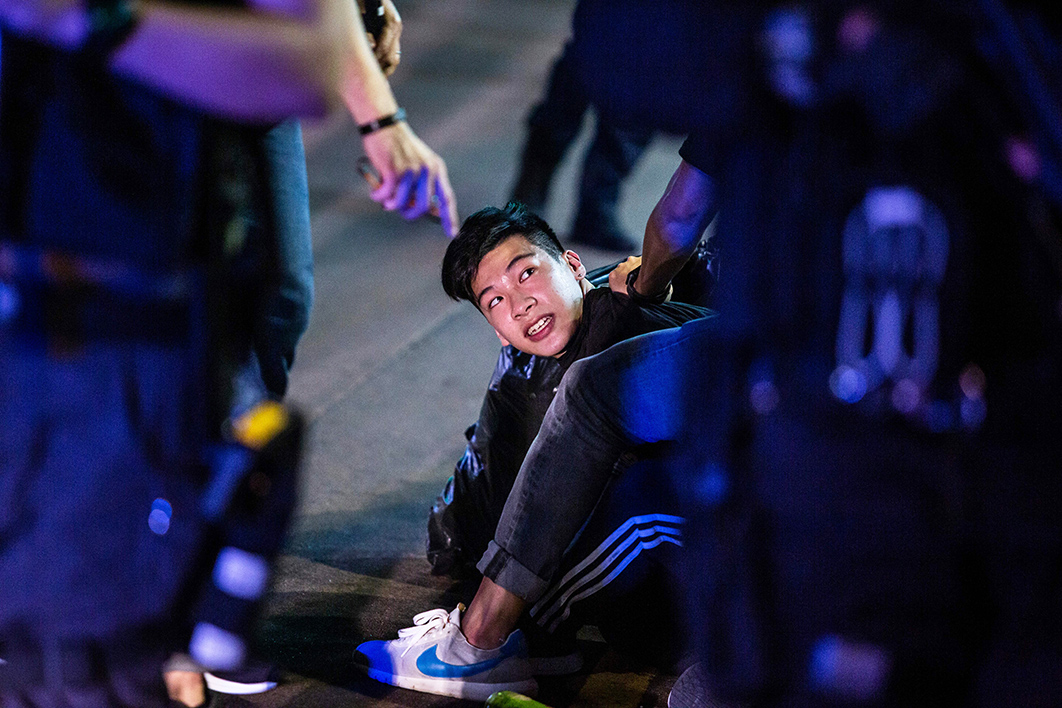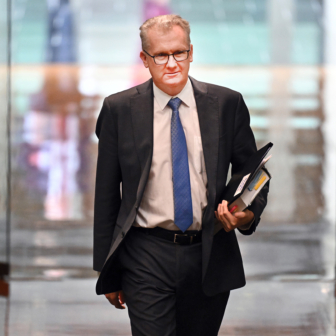Having successfully warded off the Covid-19 pandemic despite its proximity to mainland China, Hong Kong is emerging from one kind of lockdown only to find itself facing another.
The virus arrived just after the territory entered a period of calm following months of street battles between riot police and protesters after Hong Kong’s government tried to introduce a law allowing extradition of people indicted by mainland courts. The strength of this opposition, which at one point brought perhaps 1.7 million of Hong Kong’s 7.5 million people out to demonstrate, was reinforced by a voter backlash against pro-Beijing candidates in local council elections in November.
Largely thanks to the turmoil, the special autonomous region of China, as it’s been called since the handover from British rule in 1997, had experienced a year and a half of negative or only slightly positive economic growth.
Covid-19 provided another example of local people’s lack of trust in the administration of chief executive Carrie Lam. A four-day strike by frontline medical staff in early February, a week after the virus outbreak became public in the central Chinese city of Wuhan, forced the administration to shut down most routes into China’s surrounding Guangdong province, leaving open only three tightly monitored entry points.
This and other shutdown measures, plus the population’s experience of earlier mainland-origin epidemics, have got Hong Kong through with just over 1000 detected Covid-19 cases and only four deaths. But the economic cost has been high, with gross domestic product shrinking 8.9 per cent in the first quarter of this year.
The political resistance and the cumulative economic cost might have encouraged a more flexible government in Beijing to deal differently with Hong Kong’s relatively well-educated and internationally exposed people. Instead, the Chinese leadership under president Xi Jinping has upped the pressure.
In January, Xi appointed Luo Huining, a full member of the Communist Party’s central committee, as head of the Hong Kong Liaison Office, Beijing’s political watching post in the territory. He is the most senior cadre ever to fill this post. Luo had been party secretary in the important coal-mining province of Shanxi, where he purged officials belonging to the faction of Xi’s predecessor, Hu Jintao. Before that he was party secretary in Qinghai, birthplace of the current Dalai Lama, where he cracked down on the large Tibetan population.
He has quickly shown he is not in Hong Kong simply for a change of scenery. In mid April he called for stricter punishments for people who engaged in “protest violence,” and for creation of a “public opinion environment” that valued stability and security.
Soon after, on 18 April, territory police arrested some fifteen veteran politicians and activists long involved in the movement for full democratic elections for the chief executive and the Legislative Council, or Legco, the territory’s parliament. They included the former democratic minority group leader in the Legco, Martin Lee QC, and the media tycoon Jimmy Lai, founder of the liberal Apple Daily newspaper. The police charged them with organising and participating in unauthorised marches on three dates last year.
Luo also attacked a pro-democracy Legco member, Dennis Kwok, for using his position as acting committee chair to delay passage of government legislation, including a bill making it a criminal offence to abuse the Chinese national anthem. The Liaison Office called for him to be prosecuted for misconduct in public office.
These interventions violated Article 22 in the Basic Law, Hong Kong’s constitution since the 1997 handover, which states that no Chinese central government department will interfere in the internal affairs of Hong Kong. Except for foreign affairs and defence — powers reserved for Beijing and handled by the foreign ministry and the People’s Liberation Army — Beijing is supposed to put its views to the Hong Kong government via the channel correctly named the Liaison Office, rather than directly engage in debate about Hong Kong’s internal administration.
In response, the HK government issued three unusual late-night statements claiming that Luo’s remarks were legitimate, that the Liaison Office had the “right to weigh in on legislative committee matters” and, finally, that the office did not fall under Article 22 anyway.
As Hong Kong University law professor Johannes Chan wrote, “The mere fact that the government has to change its public statements three times to eventually agree with the position of the Liaison Office may serve the best testimony of an interference.”
Jerome Cohen, the pre-eminent American scholar on Chinese law, says the arrests and reinterpretation of the Basic Law were “a stunning advance toward the Chinese government’s demolition of One Country, Two Systems in fact, if not in name. This week’s actions may well be an attempt by Beijing to provoke a broad popular reaction that will then provide an excuse not only to finally bulldoze success passing controversial national security legislation in HK under Basic Law Article 23, but also to call off the crucial September election scheduled for HK’s Legislative Council.”
“We always knew there would be a reckoning for the events of 2019,” writes Antony Dapiran, a lawyer in Hong Kong and author of the recent book City on Fire: The Fight for Hong Kong. “Beijing was never going to let the Hong Kong people get away with the degree of insubordination, the direct defiance of Beijing’s rule, that they demonstrated last year.”
Like Cohen, Dapiran thinks the arrests are a prelude to the Legco elections, “part of a plan to convict and disqualify as many pan-dem [pan-democracy] politicians as possible to prevent their participation.”
If provoking street violence is the aim, Luo’s office succeeded over the last two weekends, with clashes between young demonstrators and police in parts of Kowloon. Last Friday, near-violence broke out in the Legco itself, when a pro-Beijing member, Starry Lee, tried to install herself as chair of the committee in which Dennis Kwok had been filibustering the government’s security bills. Security guards carried out two pro-democracy members during the scuffles and altercations that resulted.
The Legco’s legal adviser, Connie Fung, then reversed her decision last year that Lee didn’t have the authority to preside and a new chair must be elected. Fung declared Lee could remain in the chair because of the abnormal condition of a chair not being elected for six months.
Chinese propaganda has also ratcheted up, with the Hong Kong and Macau Office in Beijing framing the latest bleak GDP figures in this way: “We believe that the serious state of Hong Kong’s economy is caused by multiple factors… However, the biggest scourge comes from within, and that is the violent black force that openly calls for and carries out destruction… It must be solemnly pointed out that black violence and destruction are political viruses in Hong Kong society and the major enemy of ‘one country, two systems.’ Hong Kong cannot have peace until the black violence is removed.”
Many commentators have noted that, ominously, the term “virus” for political dissent has previously been used mainly to try to justify Beijing’s mass detention and “re-education” of the Uighur population of western Xinjiang.
After last weekend’s skirmishes between protesting flash mobs and police through the shopping malls of Kowloon, in which police arrested over 200 people and pepper-sprayed protesters, journalists and bystanders alike, Chief Executive Lam railed against an education system that was like a “chicken coop without a roof” in which students were being “poisoned” with “false and biased information.” The government would be “making things clear to the public within this year” on the subject of “liberal studies,” she told the Ta Kung Pao newspaper.
Hong Kong now seems set on another long, hot summer, marked by trials of the fifteen leading democrats and probably other attempts to block opposition figures from standing in the Legco elections — if they are not called off, that is. Approaching the halfway mark of the fifty years of autonomy promised with the 1997 handover, Hongkongers are trying to make the most of it.
Borrowed Place, Borrowed Time was how the late Australian journalist Richard Hughes titled a book about colonial Hong Kong. While the territory is no longer on loan from China, it still has some precious time left to show that electoral democracy and rule of law are not necessarily incompatible with being Chinese. And, unlike Xinjiang and Tibet, Hong Kong is where China has made a treaty pledge in the eyes of the world to behave well. •




